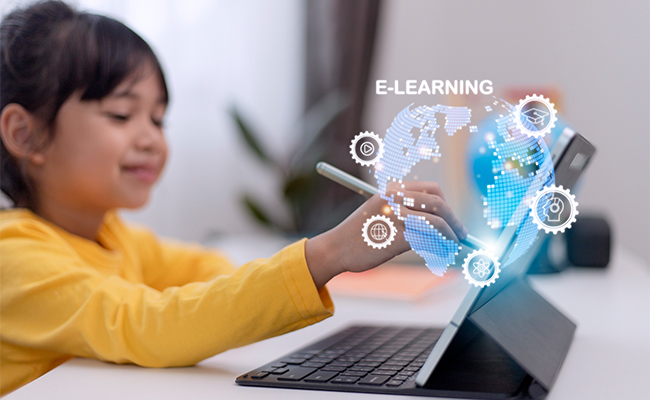Every student needs special attention and customized lessons from their teachers, but this is difficult in this fast-paced world. However, adaptive learning has emerged as a solution that makes learning easier by employing personalized techniques. This approach ensures that every student receives the special attention they need from their teachers.
Grab a pen and paper to jot down the remarkable importance, advantages, and transformative nature of adaptive learning in the realm of education.
What is Adaptive Learning?
Adaptive learning is a personalized approach that uses data-driven instructions to alter and tailor learners’ individual learning experiences to meet their unique needs. This strategy is often used in diverse learning environments, such as online courses, classrooms, or corporate training programs, and offers thorough and precise materials for comfortable learning.
This type of education gathers and tracks the learner’s studying style, grasping ability, progress, and engagement and analyzes their strengths, performance, and improvement areas.
The educational materials and exercises are dynamically adapted based on the learner’s speed and comprehension. This process ensures that the content becomes more difficult as they excel and provides extra assistance or review when they encounter difficulties. Isn’t it easy and helpful? So, let’s move ahead and learn more about its benefits.
Major Benefits of Adaptive Learning
- Adaptive learning software enhances students’ success and self-direction by providing data on their current and unmastered skills, enabling them to focus their efforts effectively.
- The system enables students to work at their individual pace, focusing on mastered concepts and gradually reviewing and practicing other subjects.
- It potentially enhances learners’ engagement by providing tailored lessons and activities to match their needs and readiness.
- It can be a cost-effective alternative to expensive textbooks.
- The system aligns course objectives, lessons, practice activities, and assessments.
- It addresses and confronts barriers for poverty-affected students by providing real-time and relevant performance data.
- It identifies individual students or particular sections in a multi-section course that need attention by delivering timely and targeted support.
- It allows teachers or trainers to make changes for continuous improvement by comparing Lerner’s data across semesters.
AI-based Adaptive Learning
Adaptive learning and AI together have become a promising and profitable solution for educational institutions and enterprises. It offers various benefits that fit into the fast-paced world of modern learning.
This AI-based learning technique enables personalized learning approaches tailored to each individual’s strengths, learning style, and capacity.
The technology presents attractive and relevant content such as videos, fonts, colors, and graphics. It also encompasses the challenges and quizzes to gain user attention and improve engagement while boosting retention, optimizing learning time, and enabling continued assessment and feedback. These factors contribute to a more efficient and productive learning process, improving learning outcomes.
This approach is characterized by its flexibility, scalability, data-driven analysis, and ease of access. By implementing this method, companies not only engage their employees effectively but also facilitate their comprehension process.
Top 5 Adaptive Learning Platforms Helping Students Excel
We have compiled a selection of the top five platforms that can assist you in acquiring knowledge.
1. RapL
RapLis an AI-driven mobile-first adaptive learning platform developed by a team of innovators. It combines microlearning and adaptive learning to create a flexible and engaging learning environment. RapL’s unique learning model tests employees’ knowledge and confidence first, then provides explanations for their answer choices later. It uses scenario-based questions in quizzes to test concepts in a practical setting, ensuring application-oriented learning.
The platform also uses an AI-backed spaced repetition model to analyze areas where employees struggle and continually practice those specific portions. This system ensures high retention of knowledge and boosts morale, motivating employees to continue upskilling.
2. Smart Sparrow
In 2011, the University of New South Wales developed Smart Sparrow, an adaptive learning platform for corporate training, higher education, and publishers. The platform simulates a one-on-one experience, allowing students to participate in practical learning.
Smart Sparrow’s half-platform, half-service feature provides direct support to educators, ensuring they have control over their program. This platform shows the in-person experience for learners, enabling them to engage in hands-on learning to the fullest extent possible.
3. Pearson Interactive Labs
Pearson Interactive Labs‘ adaptive learning platform allows students to engage in real-world scientific activities, receive professional advice, and prepare for practical labs on the go. The platform improves students’ understanding of science by teaching them to learn from errors and develop critical thinking skills. It offers cutting-edge equipment and a hybrid-lab substitute, allowing students to master various approaches from textbooks and practical experiences. Instructors provide guided feedback, enabling students to form scientific hypotheses and apply their acquired expertise.
4. CogBooks
CogBooks is an adaptive learning platform for higher education students, offering flexible, affordable courseware with one-to-one support. It uses AWS platform hosting, making it accessible from any device. It is a user-friendly platform that provides attractive and effective content.
CogBooks dynamically adjusts content to each learner’s progress, optimizing content for the right type, amount, and level, ensuring engagement and motivation throughout the course.
5. Knewton
Knewton, an adaptive learning platform founded in 2008, focuses on improving higher education learning through learning analytics. It collects data from course materials to identify effective lessons and student interaction. The platform provides educators with outstanding subject knowledge and study materials.
Knewton has signed 23 partnerships in the past seven years and increased accessibility since launching its new software, Alta.
Bottom Line
Adaptive learning holds the potential to revolutionize education by tailoring the learning experience to the unique needs and abilities of each learner. By leveraging advanced technologies and data-driven insights, these systems can provide personalized instruction, adaptive assessments, and targeted interventions, ensuring that learners receive the right content at the right time and in the right way. The future of education lies in the adaptability of learning, as it paves the way for a more personalized and impactful learning journey for every individual.


